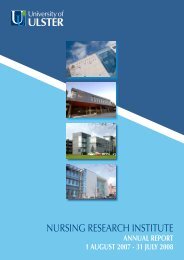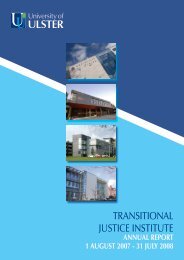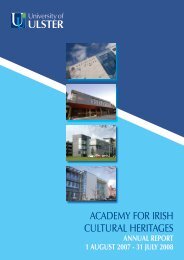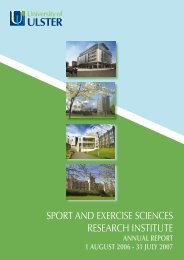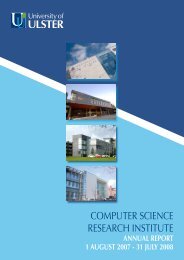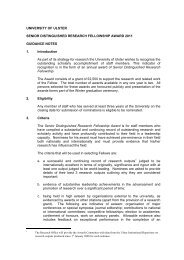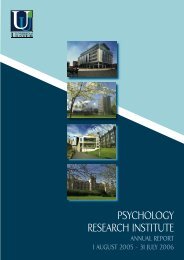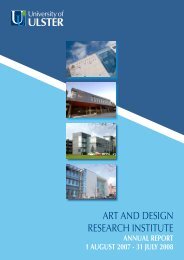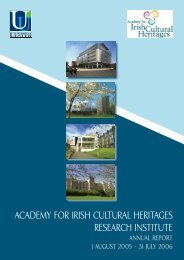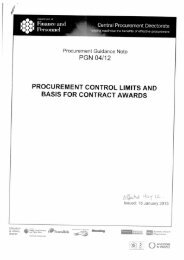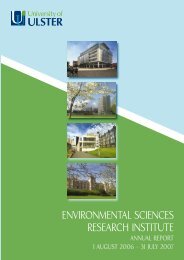6. CANCER AND AGEING RESEARCH GROUPRESEARCH STRATEGYCancer is most commonly a disease <strong>of</strong> old age, brought on by cumulative mutagenic responses to DNA damage;probably, some <strong>of</strong> the factors producing ageing are similar. This Group has, therefore, investigated factors affecting themutability and growth controls <strong>of</strong> human cells and <strong>of</strong> a variety <strong>of</strong> animal models. Cancer-related work encompassesa range <strong>of</strong> topics relevant to therapy, diagnosis or causation. Direct <strong>research</strong> into ageing involves studies <strong>of</strong> ageingsyndromes: such as Alzheimer’s Disease and Werner Syndrome.The Group uses a wide range <strong>of</strong> facilities, including proteomic facilities with 2D electrophoresis and a spot-pickingrobot, a QTOF Ultima mass spectrometer, Xray and caesium gamma sources, whole-body imaging for mice, andventilated isolation cages for handling immuno-compromised mice.MEMBERS OF THE GROUPAcademic Staff:Pr<strong>of</strong>essor Stephen Downes, Group LeaderPr<strong>of</strong>essor <strong>of</strong> Cancer BiologyContact Details:T: +44 (0)28 70324121cs.downes@ulster.ac.ukPr<strong>of</strong>essor Downes’ main <strong>research</strong> interests are:in cancer biology:• Cell cycle control, concentrating on control <strong>of</strong> progression into G2/M by decatenation, damage and replicationcheckpoints;• DNA damage as detected by the Comet assay, and variations <strong>of</strong> that assay;• Creation <strong>of</strong> novel vectors to display results <strong>of</strong> different classes <strong>of</strong> DNA damage;• DNA repair mechanisms (excision, postreplication, mismatch); and molecular basis <strong>of</strong> repair deficiency inthymidine kinase defective cells;• Signaling networks, particularly in lung and colon cancer;• Nutritional aspects <strong>of</strong> carcinogenesis, particularly mechanisms by which dietary folate or salicylate insufficiencymay affect colon cancer.in ageing:• Mechanisms defective in progeroid syndromes, especially Werner syndrome and Cockayne syndrome;• Excess DNA damage in Alzheimer syndrome.30
<strong>Research</strong> deliverables:Better understanding <strong>of</strong> mechanisms <strong>of</strong> carcinogenesis and <strong>of</strong> ageing, leading to rationally based strategies for avoiding,delaying or treating them.Better understanding <strong>of</strong> the rather tenuous relationship between nationality and ethnic origins.Pr<strong>of</strong>essor Downes was a Member <strong>of</strong> the 2008 RAE Sub-Panel 12, Allied Health Pr<strong>of</strong>essions and Studies and an invitedspeaker on: “Systems Biology for Medical Applications”, FW6 Workshop on Cancer-Ageing link, Paris, in February2008.Publications:Fuss H, Kurth MJ, Downes CS, Dubitzky W; Deactivation <strong>of</strong> Src family kinases: Hypothesis testing using a Monte Carlosensitivity analysis <strong>of</strong> systems-level properties, Journal <strong>of</strong> Computational Biology, 14: 1185-1200, 2007Graham JE, Moore JE, Jiru X, Moore JE, Goodall EA, Dooley JS, Hayes VE, Dartt DA, Downes CS, Moore TC; Ocularpathogen or commensal: a PCR-based study <strong>of</strong> surface bacterial flora in normal and dry eyes; Investigative OphthalmolVis Sci., 48: 5616-23, 2007Sanderson P, Stone E, Kim YI, Mathers JC, Kampman E, Downes CS, Muir KR and Baron JA; Folate and colo-rectalcancer risk; British Journal <strong>of</strong> Nutrition, 98: 1299-304, 2007Tömöry G, Csányi B, Bogácsi-Szabó E, Kalmár T, Czibula Á, Csõsz A, Priskin K, Mende B, Langó P, Downes CS and RaskóI; Comparison <strong>of</strong> maternal lineages and phylogenetic analysis <strong>of</strong> ancient and modern Hungarian populations; AmericanJournal <strong>of</strong> Phys. Anthropol., 134, 354-368, 2007Csányi B, Bogácsi-Szabó E, Tömöry G, Czibula Á, Priskin K, Csõsz A, Mende B, Langó P, Csete K, Zsolnai A, ConantEK, Downes CS and Raskó I; Y-chromosome analysis <strong>of</strong> ancient Hungarian and two modern Hungarian-speakingpopulations from the Carpathian Basin; Ann Human Genetics, 72: 519-534, 2008Fuss H, Dubitzky W, Downes CS and Kurth MJ; Src family kinases and receptors: analysis <strong>of</strong> three activation mechanismsby dynamic systems modeling; Biophysical Journal, 94: 1995-2006, 2008Graham JE, Graham RLJ, Beirne R, McGilligan VE, Downes CS, Moore JE, Moore CBT, McMullan G; The use <strong>of</strong>conjunctival swab for the proteomic characterisation <strong>of</strong> Dry Eye Syndrome; Journal <strong>of</strong> Proteomics and Bioinformatics;1: 20-33, 2008Wasson GR, Downes CS and McKelvey-Martin VJ; The use <strong>of</strong> the Comet assay in the study <strong>of</strong> human nutrition andcancer; Mutagenesis, 23: 153-162, 2008Pr<strong>of</strong>essor Stephanie McKeownPr<strong>of</strong>essor <strong>of</strong> Cancer Biology31
- Page 1: BIOMEDICAL SCIENCESRESEARCH INSTITU
- Page 4 and 5: 1 Foreword by the Pro Vice-Chancell
- Page 6 and 7: 2 Foreword by the Research Institut
- Page 8 and 9: The BMSRI Research StructureThe BMS
- Page 10 and 11: BMSRI Core FacilitiesContact: Karen
- Page 12 and 13: of Metabolomics, pharmacy, nutritio
- Page 14 and 15: BMSRI Academic Heads new Regional N
- Page 16 and 17: 4. BIOMEDICAL GENOMICS RESEARCH GRO
- Page 18 and 19: Recent Funding Initiatives:C-TRIC:
- Page 20 and 21: Dr Mateus Webba da SilvaLecturer in
- Page 22 and 23: 5. BIOIMAGING RESEARCH GROUPResearc
- Page 24 and 25: developmental alterations that mani
- Page 26 and 27: Publications:Bigot S, Lucas L, Morr
- Page 28 and 29: Publications:Barnes CA, O’Hagan B
- Page 30 and 31: We also measure the genotoxic effec
- Page 34 and 35: Professor Anthony P McHaleProfessor
- Page 36 and 37: Professor Stephanie McKeownProfesso
- Page 38 and 39: an Alzheimer Research Trust collabo
- Page 40 and 41: JM, Waugh DJJ; Dexamethasone potent
- Page 42 and 43: have wider applications in vivo, in
- Page 44 and 45: Inter-relationships between diet an
- Page 46 and 47: Flatt PR; Effective surgical treatm
- Page 48 and 49: These areas are the subject of seve
- Page 50 and 51: Dr YHA Abdel-WahabSenior Lecturer i
- Page 52 and 53: Dr VA GaultLecturer in Molecular Bi
- Page 54 and 55: McClean PL, Irwin N, Hunter K, Gaul
- Page 56 and 57: Publications:Duffy NA, Green BD, Ir
- Page 58 and 59: 8. MICROBIOLOGY AND BIOTECHNOLOGYRE
- Page 60 and 61: Publications:Graham RJL, Graham C,
- Page 62 and 63: analyses. However there is still a
- Page 64 and 65: Plessas S, Bekatorou A, Koutinas AA
- Page 66 and 67: Biochemical studies/ viral evasion
- Page 68 and 69: Dr Stephen McCleanLecturer in Prote
- Page 70 and 71: environmental remediation and as ro
- Page 72 and 73: 9. NORTHERN IRELAND CENTRE FOR FOOD
- Page 74 and 75: 26-28 Sept 2007: International Seaf
- Page 76 and 77: Dr Barnes has developed expertise i
- Page 78 and 79: Dr Alison GallagherSenior Lecturer
- Page 80 and 81: In addition, results of a pilot stu
- Page 82 and 83:
Dr Maeve KerrResearch AssociateCont
- Page 84 and 85:
Memberships of External Committees/
- Page 86 and 87:
Indicators of Esteem:Professor McNu
- Page 88 and 89:
were examined. The intervention and
- Page 90 and 91:
Within this work both short-term an
- Page 92 and 93:
micronutrient supplementation at a
- Page 94 and 95:
10. STEM CELL & EPIGENETICS RESEARC
- Page 96 and 97:
Publications:Lees-Murdock DJ, Lau H
- Page 98 and 99:
Publications:Lees-Murdock DJ, Lau H
- Page 100 and 101:
11. SYSTEMS BIOLOGY RESEARCH GROUPT
- Page 102 and 103:
Kravtsov V, Swain M, Schuster A, Du
- Page 104 and 105:
Dr Daniel BerrarLecturer in Biomedi
- Page 106 and 107:
Zhang et al; Incorporating Feature
- Page 108 and 109:
Bala P, Baldridge K, Benfenati E, C
- Page 110 and 111:
In addition there is a growing them
- Page 112 and 113:
Clinical work involves development
- Page 114 and 115:
In 2009 he was appointed Chairman o
- Page 116 and 117:
Stevenson TR, Goodall EA and Moore
- Page 118 and 119:
Dr Raymond BeirneLecturer in Optome
- Page 120 and 121:
Dr Julie McClellandLecturer in Opto
- Page 122 and 123:
Graham JE, Moore JE, Moore JE, McCl
- Page 124 and 125:
Research Staff:Dr David OrrSenior R
- Page 126 and 127:
Dr Victoria McGilliganResearch Asso
- Page 128 and 129:
13. Externally Funded Projects duri
- Page 130 and 131:
Grant Holder Anderson, Prof RSFundi
- Page 132 and 133:
Funding Body Royal Irish AcademyAmo
- Page 134 and 135:
14. BIOMEDICAL SCIENCES RESEARCH IN
- Page 136 and 137:
Student: Simon GenglerTitle: Effect
- Page 138 and 139:
Student: Anisha MazumdarTitle: Anal
- Page 140 and 141:
Student: Clare RyanTitle: How does
- Page 142 and 143:
CONGRATULATIONS TO THE FOLLOWING PO



